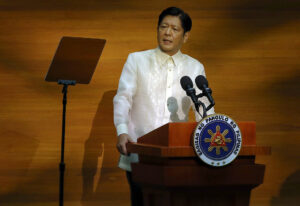Marcos vows tax system overhaul

By Kyle Aristophere T. Atienza, Reporter
PHILIPPINE PRESIDENT Ferdinand R. Marcos, Jr. on Monday vowed to overhaul the tax system and unveiled a 19-point legislative agenda designed to spur growth and make the Philippines an investment destination, as the economy recovers from the coronavirus disease 2019 (COVID-19) pandemic.
Mr. Marcos began his first State of the Nation Address (SONA) with a promise to implement sound fiscal management and tax administration reforms to boost revenue collections.
“Our tax system will be adjusted in order to catch up with the rapid development of the digital economy,” Mr. Marcos told Congress on Monday, proposing a value-added tax on digital services, which would generate P11.7 billion in revenues if implemented in 2023.
The Marcos administration is targeting 6.5-7.5% gross domestic product (GDP) growth this year, and 6.5-8% GDP expansion through 2028.
Mr. Marcos pledged to bring down the poverty rate to 9% by the end of his term in 2028, and the National Government deficit-to-GDP ratio to 3%. The government also aimed to lower the debt-to-GDP ratio to less than 60% by 2025, and to attain upper middle-income status by 2024.
The President said the administration’s expenditure priorities will be realigned and spending efficiency will be improved to address the scarring effect of the pandemic and prepare the country for future shocks.
“Our country must become an investment destination,” he added.
LEGISLATIVE PRIORITYMr. Marcos identified 19 priority legislative measures, which included National Government rightsizing, budget modernization, and the last two remaining tax reform packages of the Duterte administration — the Real Property Valuation and Assessment Reform Act and Passive Income and Financial Intermediary Taxation Act.
The tax reform packages were approved by the House of Representatives during the 18th Congress, but failed to hurdle the Senate.
Like his predecessor, Mr. Marcos is also pushing for the passage of the proposed Government Financial Institutions Unified Initiatives to Distressed Enterprises for Economic Recovery (GUIDE) Act and the E-Government Act, which seeks to digitize the bureaucracy.
He urged Congress to approve bills creating the Virology Institute of the Philippines and the Department of Water Resources, calling for the “ethical” planning of the country’s land and water resources.
As part of his thrust to pursue public-private partnerships, Mr. Marcos is pushing for amendments to the Build-Operate-Transfer Law.
Mr. Marcos said his administration would push for an enabling law for the natural gas industry and amendments to the Electric Power Industry Reform Act (EPIRA), which led to the privatization of the country’s energy industry.
The Philippine leader, who has pledged to facilitate a shift to renewables, also signaled his intent to review nuclear power — a plan that his late father and former president Ferdinand E. Marcos, Sr. started in the 1970s.
He also promised to accelerate infrastructure projects, such as airports and railways, and to go after firms that damage the environment.
Mr. Marcos proposed the establishment of a medical reserve corps and National Disease Prevention Management Authority, a Unified Military and Uniformed Services Personnel Separation, Retirement, and Pension Act; a National Defense Act, and a bill that would reinstate the mandatory Reserve Officers’ Training Corps.
AGRICULTUREMr. Marcos, who also heads the Agriculture department, bared his plans to revive the agriculture sector and to continue agrarian reform programs.
He promised to sign an executive order imposing a one-year moratorium on payment of land amortization and interest payments, which he said will help farmers increase their output.
Mr. Marcos also asked Congress to pass a law condoning P58.1 billion worth of loans of some 654,000 agrarian reform beneficiaries.
“Agrarian reform beneficiaries who are still to receive their awarded land under the comprehensive agrarian reform program shall receive it without any obligation to pay any amortization,” he said.
The President also pledged to distribute unused agricultural lands of the government to landless war veterans and their surviving families, retired military and police personnel, and college graduates with agriculture degrees.
“The call of the times is for the infusion of fresh and new blood in the agricultural sector. We need a new breed of farmers equipped with modern agricultural technology able to engage in sustained scientific farming that will not only increase farm yields, but also resilience in the face of climate change,” Mr. Marcos said.
ECONOMIC RECOVERY“We will endure. Let our Filipino spirit ever remain undimmed,” Mr. Marcos said as he capped his speech that lasted over an hour. “The state of the nation is sound.”
Michael Henry Ll. Yusingco, a policy analyst, said it is now clear the focus of the new administration is economic recovery.
“The President has offered policy details this time around as well as a detailed plan. We also have a list of priority legislations,” he said in a Messenger chat. “As analysts, we now have something to work with, meaning something concrete to study.”
Leonardo A. Lanzona, who teaches economics at the Ateneo de Manila University, said the SONA seemed to focus on technological change and institutional reform, which are needed but are long term in nature.
Mr. Marcos also fell short of discussing the issues confronting the education sector, which needs to be prioritized amid the eroding quality of the labor force, Mr. Lanzona said.
In his SONA, Mr. Marcos vowed to protect the country’s territories but did not send a strong message against China’s aggression in Philippine-claimed areas in the South China Sea. He also insisted his administration will have an independent foreign policy.
“I will not preside over any process that will abandon even one square inch of territory of the Republic of the Philippines to any foreign power,” he said.
As the pandemic continues, Mr. Marcos also vowed to build more health centers and hospitals across the country.
“I’m impressed that the President promised to overhaul the healthcare system. This was happily welcomed by the lawmakers in attendance, so there is reason to believe that they will work on this vigorously,” Mr. Yusingco said.
Hansley A. Juliano, a political economy researcher studying at Nagoya University’s Graduate School of International Development in Japan, said the SONA reflects the “technocratic agenda of the business allies of Marcos and his economic architects.”
“He acknowledges the economic issues faced by the country but for very understandable reasons, he is keeping the business-as-usual, macro-oriented projections over direct impact on people’s lives,” he added.
Mr. Juliano said contentious issues, including labor and indigenous peoples’ rights, will “once again be sidelined if not flat out ignored altogether in the governance.”
The President, despite his promise to improve the lives of Filipinos, did not touch on his human rights agenda, which experts said is necessary amid the shrinking space for civil societies.
“There is no mention of contentious areas such as political reforms, corruption, and human rights,” Arjan P. Aguirre, who teaches political science at the Ateneo de Manila University, said in a Messenger chat.




